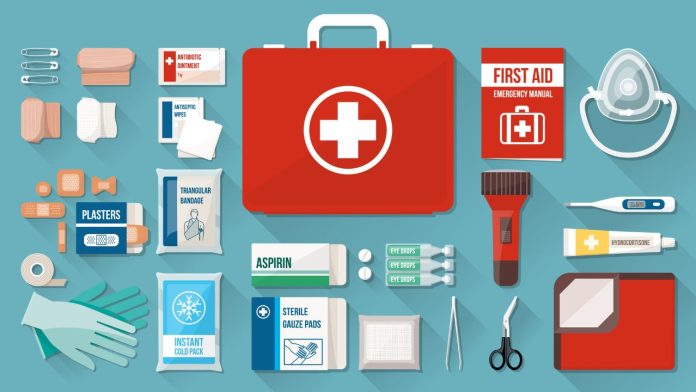In emergency medical situations, first aid is essential and can save lives in cases of heart attacks, seizures, strokes, car accidents, etc. It could be a set of methods for preserving lives, fundamental medications for certain ailments, bandages, analgesics, or ointments. Knowledge and awareness of topics like CPR, the Heimlich maneuver, controlling bleeding, using an AED, and how to treat snake bites are crucial. A bystander, a family member, or a coworker can offer first aid. Before an ambulance arrives or someone is admitted to the hospital in the event of a sudden injury or illness, onlookers may play a crucial role.
Having an emergency medical kit on hand is essential for giving emergency care in unforeseen circumstances. Here are some necessities to remember:
• Adhesive bandages, available in a variety of sizes for minor wounds and injuries.
• Sterile gauze and dressings: Used to stop bleeding from bigger wounds.
• Adhesive tape: Used to hold dressings and bandages in place.
• Antiseptic wipes or solution: Used to clean cuts and stop the spread of infection.
• Scissors: Used to cut through cloth, tape, gauze, and other materials.
• Thermometer: For keeping track of body temperature.
• Digital thermometer: reliable and child-safe
• Cotton swabs or balls: These are helpful for applying or cleaning ointments.
• Disposable gloves: These safeguard both the patient and the carer.
• Over-the-counter drugs that reduce pain.
• Mouth-to-mouth resuscitation face shield or mask for performing CPR safely.
• Instant cold packs: To relieve injuries and minimize swelling.
• Burn gel or cream: used to treat small burns.
• Prescription drugs: If someone in your family needs prescription drugs for a particular medical condition, keep those drugs on hand.
• Emergency contact information: A list of crucial phone numbers, such as those for your local emergency services, your doctor, and your family.
• Copies of identity documents, health records, and insurance information are all examples of personal information.
• Every citizen should be taught in CPR, and emergency kits should have defibrillators. For example, in most Scandinavian nations, there is a defibrillator placed every few yards to aid with resuscitation. In India, it is a long shot. As a starting step, let’s hope that CPR instruction becomes a requirement for all residents, as it has the potential to save many lives.

 हिंदी
हिंदी






